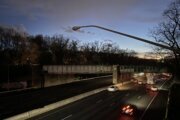ASHRAF SWEILAM
Associated Press
EL-ARISH, Egypt (AP) — A powerful explosion killed five Egyptian police conscripts and an officer near the border town of Rafah in the restive Sinai Peninsula early Tuesday, in an attack that bore the hallmarks of a local al-Qaida-inspired group, Egyptian security officials said.
The Interior Ministry and a security official said the bomb was hidden deep under the asphalt of a highway, in an area called Wadi Halfa, where a joint police and army force was passing early in the morning.
The official said the blast shredded the armored vehicle and tore the policemen’s bodies to pieces. The force was assigned to detect explosives but it was unclear if they were searching for them at the time of the attack.
No further details were immediately available. The official spoke on condition of anonymity because he is not authorized to brief the media.
Islamic extremists have escalated attacks over the past year against police and army personnel in retaliation for the military-led ouster of Islamist President Mohammed Morsi in July 2013 after mass demonstrations against him. Suicide bombings, assassinations and roadside bombs have claimed the lives of dozens of policemen and army officers. Recently, militants have beheaded men they accused of spying on them for Israeli intelligence.
Authorities blame Morsi’s Muslim Brotherhood group for the violence, allegations denied by the Brotherhood. An al-Qaida-inspired group known as Ansar Beit al-Maqdis has claimed responsibility for most of the major attacks. The group says it is avenging the authorities’ extensive crackdown on Morsi’s Islamist supporters, which has seen hundreds killed in street clashes and thousands detained.
The insurgency is more intense in the Sinai Peninsula, home to Ansar Beit al-Maqdis and other extremist militants. For years, the northern region bordering Gaza and Israel has been a militant stronghold and a conduit for the smuggling of weapons and other goods.
Tuesday’s bombing is identical to a Sept. 2 explosion that killed 11 police officers in the same area, also with an underground roadside bomb detonated by remote.
Ansar Beit al-Maqdis claimed responsibility for the attack days later, posting a video showing its preparation and execution as militants shouted “God is great.”
Since Morsi’s ouster, Egypt’s military and police have launched a wide offensive against the militants. On Monday, the military said its troops had killed 56 militants and seized a large amount of explosives since Aug. 31.
Authorities have also adopted a tough line on demonstrations, passing a draconian law last year that criminalizes all unauthorized protests and arresting Islamist and non-Islamist activists alike, including leading secular figures from the massive protests that toppled President Hosni Mubarak in 2011.
A government body is working on drafting amendments to the disputed protest law, which bans demonstrations without a police permit, Transitional Justice Ministry spokesman Mahmoud Abdel-Bari told The Associated Press on Tuesday.
Abdel-Bari said the ministry will announce a draft law within days, after considering demands for lighter penalties than the existing “heavy ones” and changes in procedures related to obtaining permits. After the ministry drafts the law, it will be up to the Cabinet and the president to enact them.
The changes were initially presented by the state-run National Human Rights Council following a discussion over the law between its head and President Abdel-Fattah el-Sissi.
A council member, Gamal Fahmy, said one amendment would require organizers to merely notify police rather than secure a permit. If security authorities have objections, they could then seek a court ruling.
“It will be the judge who rules whether these objections are valid or not,” Fahmy said. Above all, he said, the proposed law imposes only fines and not prison time on those who violate it.
The original law was enacted last November, five months after Morsi’s ouster. It bans public gatherings of more than 10 people without prior police approval. The permit should be obtained three days in advance. It imposes hefty fines and prison terms for violators. It also empowered security agencies to use force to break up protests.
Nearly two months after the law went into effect, several icons of Egypt’s 2011 uprising were imprisoned for violating it.
Copyright 2014 The Associated Press. All rights reserved. This material may not be published, broadcast, rewritten or redistributed.







